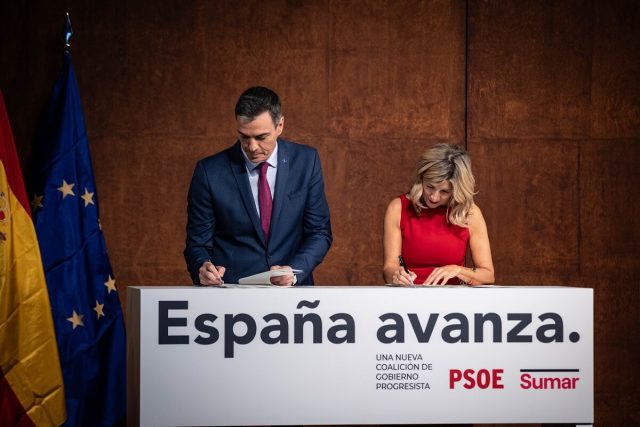
This week the ministers of the recently-formed Spanish governemnt have presented their main lines of work for the next four years.
However, the coalition government made up by the Spanish Socialist Party (PSOE) and the far-left party Sumar have–once again–faced a challenge in the debate over whether to extend or not the anti-crisis measures approved in 2022. The mainstream media is hardly picking up on these tensions.
This package of measures is designed to combat the effects of inflation and the crisis exacerbated by the situation in Ukraine. This new clash between Socialist Pedro Sánchez and progressive Yolanda Díaz not only tests the cohesion and stability of the cabinet but also reveals that the unity in the leadership of the progressive government, as they define themselves, has notable cracks when it comes to addressing issues related to the economy and social assistance policies.
In the hours leading up to the approval of the royal decree by the Council of Ministers last December, negotiations between PSOE and Sumar reached their peak. The focus of discord lies in the extension of free public transportation and the details of special taxes on banks and energy companies, which are part of the Recovery Plan.
Yolanda Díaz, Minister of Labour and second Deputy Prime Minister, has led the discussions from the Sumar coalition, defending the position of not making cuts in both areas.
It is noteworthy that in his debate to be reelected premier, Pedro Sánchez announced the extension of free public transportation for minors, youth, and the unemployed, as well as the reduction of VAT on basic food items. However, disagreements about the extension and scope of these measures have sparked intense debate. While Sumar advocates for an extension on current terms, the PSOE seeks adjustments in specific points.
Amidst these negotiations, the government has announced a series of additional measures related to housing. This includes a new line of guarantees of €2 billion aimed at promoting the construction of affordable rental housing, both publicly and privately. This measure complements the €4 billion in loans outlined in the European recovery plan addendum, with the aim of constructing over 40,000 new homes. A key requirement is that these homes be energy-efficient, and the guarantees can also be used for rehabilitation projects. The addition of guarantees to existing loans aims to further boost these operations.
In the complex web of negotiations, the three Deputy PMs (Finance, Labor, Ecological Transition,) play a central role. The coalition led by Yolanda Díaz remains firm in defending measures such as the ban on evictions of vulnerable people until 2025, an achievement that has strengthened their position at the negotiating table.
Tensions have also emerged on other fronts, such as the summoning of judges to testify in committees on lawfare. Sumar spokesperson Marta Lois defends the participation of judges in these committees as a sign of “democratic normality,” while the PSOE takes a more restrictive stance.
The disagreement between PSOE and Sumar on the extraordinary tax on energy companies has left a bittersweet taste in the coalition. Although they have managed to maintain measures such as the reduction of public transportation and the ban on layoffs and evictions, the controversy over green taxation highlights the fundamental differences between the two forces.
This disagreement on taxes for energy companies and banks raises legitimate questions about whether divisions within the PSOE-Sumar coalition could have significant consequences for the execution of the country’s Recovery Plan. The difficulty in reaching agreements on key economic issues questions the government’s ability to effectively implement the necessary measures for economic recovery, undermining confidence in its ability to manage the crisis and affecting the coherence of the comprehensive plan.



 Subscribe
Subscribe